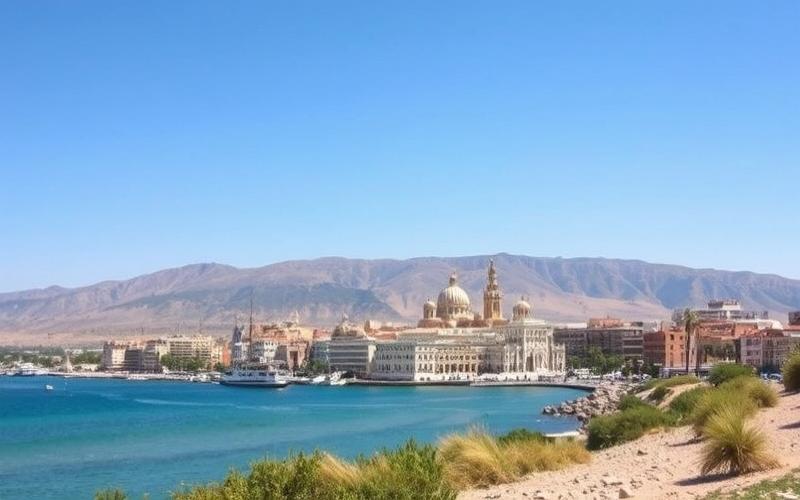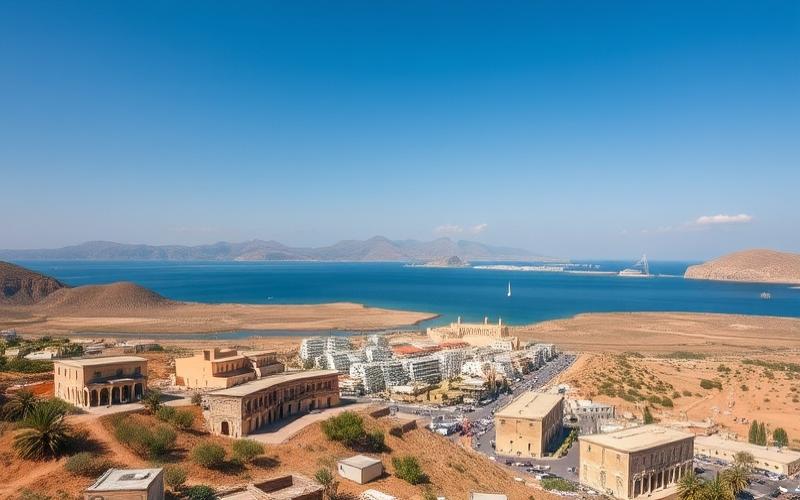
 Published on and written by Cyril Jarnias
Published on and written by Cyril Jarnias
Relocating to Cyprus is an exciting adventure, but it requires adapting to a climate quite different from that of France. With its Mediterranean climate characterized by hot, dry summers and mild, wet winters, Cyprus offers a pleasant living environment that can present certain challenges for newcomers. In this article, we provide practical tips to help you acclimate smoothly and fully enjoy your new life under the Cypriot sun.
Understanding the Cypriot Climate
Before diving into adaptation tips, it’s essential to understand the specifics of the local climate. Cyprus enjoys a Mediterranean climate characterized by:
– Long, hot, and dry summers (June to September) – Short, mild winters (December to February) – Pleasant transitional periods in spring and autumn – Generous sunshine with over 300 sunny days per year – Limited rainfall, mainly concentrated in winter
Summer temperatures can easily exceed 95°F (35°C), particularly in the island’s interior regions. In winter, temperatures rarely drop below 50°F (10°C) along the coasts, but mountainous areas can experience cooler temperatures and even occasional snowfall.
Climate Impacts on Health and Well-being
The Cypriot climate can have various effects on expatriates’ health and well-being, including:
Dehydration: High temperatures and dry air promote significant sweating, increasing the risk of dehydration.
Heatstroke: Prolonged exposure to sun and high temperatures can cause discomfort, headaches, or heatstroke.
Respiratory Issues: Dry air can irritate the respiratory tract, especially in sensitive individuals or those with asthma.
Sleep Disturbances: Hot summer nights can disrupt sleep and lead to fatigue.
Seasonal Allergies: Pollen from certain Mediterranean plants can cause allergic reactions in sensitive individuals.
To prevent these discomforts, it’s crucial to adopt habits suited to the local climate.
Strategies for Adapting to the Cypriot Climate
Hydration and Nutrition
– Drink plenty of water throughout the day, even if you’re not thirsty. Aim for at least 2 liters of water daily. – Prioritize water-rich foods like fresh fruits and vegetables. – Limit consumption of alcohol and caffeine, which promote dehydration. – Adopt the local Mediterranean diet, rich in fruits, vegetables, olive oil, and fish, which is particularly suited to the climate.
Sun Protection
– Apply high-SPF sunscreen (SPF 50+) generously every two hours. – Wear light, loose-fitting, light-colored clothing to reflect the sun’s rays. – Protect your head with a wide-brimmed hat and your eyes with sunglasses. – Avoid sun exposure between 11 AM and 4 PM, when the rays are most intense.
Heat Management
– Schedule outdoor activities for early morning or late afternoon to avoid the hottest hours. – Take lukewarm showers to cool down without causing thermal shock. – Use fans or air conditioning, but be careful not to create too large a temperature difference with the outdoors. – Adopt the summer siesta, a Mediterranean tradition that allows for rest during the hottest hours.
Gradual Adaptation
– Allow yourself a few weeks of acclimatization upon arrival. – Start with light activities and gradually increase their intensity. – Listen to your body and rest if you feel signs of fatigue or discomfort.
Good to Know:
Acclimating to the Cypriot climate can take several weeks. Be patient and kind to yourself during this adaptation period.
Home Adjustments for Climate Comfort
Your home setup plays a crucial role in your daily comfort. Here are some tips to optimize your interior:
Insulation and Ventilation
– Choose double-glazed windows for better thermal insulation. – Install external blinds or shutters to block heat before it enters the house. – Create cross-ventilation by opening opposite windows early in the morning and late in the evening. – Invest in a reversible air conditioning system for heating in winter and cooling in summer.
Material Choices
– Prefer tile or natural stone floors that stay cool in summer. – Choose thick, light-colored curtains to reflect heat. – Use natural, breathable fabrics for your bedding (cotton, linen).
Outdoor Arrangement
– Create shaded areas in your garden or on your terrace with pergolas or umbrellas. – Plant deciduous trees that will provide shade in summer and let sunlight through in winter. – Install an automatic irrigation system to keep your garden green despite the heat.
Clothing and Equipment Suitable for the Cypriot Climate
To live comfortably in Cyprus, it’s essential to adapt your wardrobe and equipment to the local climate:
Clothing
– Prefer natural, breathable fabrics like cotton, linen, or silk. – Choose loose-fitting, light-colored clothing for summer. – Pack some light sweaters and a waterproof jacket for cool winter evenings. – Don’t forget swimsuits and sarongs for enjoying the beaches.
Footwear
– Choose comfortable, airy sandals for summer. – Have closed, waterproof shoes for the rare rainy winter days. – Invest in good hiking shoes if you plan to explore the island’s trails.
Accessories
– Get several hats or caps to protect yourself from the sun. – Invest in quality sunglasses with UV protection. – Always keep an insulated water bottle handy to stay hydrated.
Seasonal Management and Suitable Activities
The Cypriot climate offers varied opportunities throughout the year. Here’s how to make the most of them:
Summer (June to September)
– Enjoy the beaches early in the morning or late afternoon. – Explore mountain villages where temperatures are milder. – Participate in the many summer festivals organized on the island.
Autumn (October to November)
– This is the ideal time for hiking and outdoor activities. – Discover Cypriot vineyards during the harvest season. – Enjoy the still-warm sea for water activities.
Winter (December to February)
– Visit archaeological sites and museums without the summer crowds. – Practice skiing in the Troodos mountains (if conditions allow). – Participate in Christmas and New Year festivities in coastal cities.
Spring (March to May)
– Admire the blooming wildflower fields. – Participate in Easter celebrations, an important holiday in Cyprus. – Start enjoying the beaches before the peak tourist season arrives.
Good to Know:
Each season in Cyprus offers its own charms and activities. Plan your discoveries according to the climate to fully enjoy your expatriation experience.
Preventing Climate-Related Illnesses
Although Cyprus is a safe country health-wise, certain precautions should be taken:
Insect Protection
– Use mosquito repellents, especially active in summer. – Install window screens in your home. – Avoid stagnant water around your residence.
Allergy Prevention
– Consult a local allergist to identify problematic pollens. – Follow pollen reports and adjust your activities accordingly. – Keep windows closed during pollen peaks.
Air Quality Monitoring
– Stay informed about air quality, which can be affected by desert winds in summer. – Limit outdoor activities during pollution episodes. – Invest in an air purifier for your home if necessary.
Conclusion
Adapting to Cyprus’ climate certainly requires some adjustments, but in return offers an exceptional quality of life. By following these tips and listening to your body, you’ll quickly be able to fully enjoy the benefits of this Mediterranean climate. Remember that everyone reacts differently to climate change, so give yourself the necessary time to find your rhythm and habits.
Relocating to Cyprus is a unique opportunity to live at the rhythm of the sun and sea while discovering a rich and welcoming culture. With good preparation and a positive attitude, you’ll quickly turn climate challenges into genuine assets for your new island life.
Disclaimer: The information provided on this website is for informational purposes only and does not constitute financial, legal, or professional advice. We encourage you to consult qualified experts before making any investment, real estate, or expatriation decisions. Although we strive to maintain up-to-date and accurate information, we do not guarantee the completeness, accuracy, or timeliness of the proposed content. As investment and expatriation involve risks, we disclaim any liability for potential losses or damages arising from the use of this site. Your use of this site confirms your acceptance of these terms and your understanding of the associated risks.



























